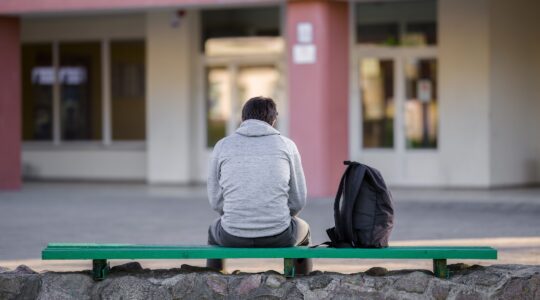“How can the act of listening anchor our lives with compassion, interconnection, and a shared commitment to justice?” asked Ruth Messinger, past president of American Jewish World Service, during a JDOV conference. Her speech, “Reframing the Shema to Repair the World,” conveyed that the Shema teaches us an important Jewish value: to listen to one another. By listening to differing points of views, Messinger explained that she was able to better understand the challenges in a community and collaborate with others to pursue justice.
Yet, how am I supposed to live by this Jewish value of listening to others, when American culture is so divided today? For the most part, Americans are either Democrats or Republicans, and very few people try to understand the other side. Even worse, social media posts and Google searches are filtered to only show us ideas with which we agree.
This divisive culture makes it hard for Jewish Americans to practice what we value. When everybody is so focused on arguing, we oftentimes forget that everyone is made btzelem Elohim (in God’s image) and deserves respect. Whether or not you agree with what another person has to say, they deserve your utmost attention when they are speaking. If you disagree with the point they are making, you can have a productive conversation with them by stating your opinion and understanding where they are coming from. By the end of your discussion, you will find that you agree on more things than you thought, and compromises can be made. However, without kavod (respect for others) we cannot have these civil conversations, and, in the end, we will just argue and nothing productive will occur.
Through my participation in Young Judaea camps and Year-Round Programming, I have learned how to listen to the people I am working with, while also contributing my own ideas. Young Judaea is a Zionist Youth Organization, and therefore, conversations about Israel come up frequently. We often debate the definition of Zionism and whether or not you can be a Zionist if you disagree with some decisions that the Israeli government makes. In order to figure out how I define my Zionism and better understand issues in Israel, I have decided to participate in Young Judaea’s Year Course, a gap year in Israel next year. I want to be able to understand the conflicts in Israel by listening to people who live there and hearing different perspectives and narratives. I want to gain knowledge not only about the conflict in Israel, but about how to have conversations about Israel, especially with people whom I disagree. I plan to come back from my gap year ready to facilitate constructive conversations on Israel as a Young Judaea college advisor, at Barnard Hillel and as a Hebrew School teacher. While modern American life makes it difficult to live by the Jewish value of the Shema, we can be inspired by the Shema to have productive, respectful conversations.
Liora Reiken is a senior at White Plains High School. She is a Staff Writer for Fresh Ink for Teens.
Fresh Ink for Teens is an online magazine written by, and for, Jewish students from high schools around the world.
The New York Jewish Week brings you the stories behind the headlines, keeping you connected to Jewish life in New York. Help sustain the reporting you trust by donating today.




